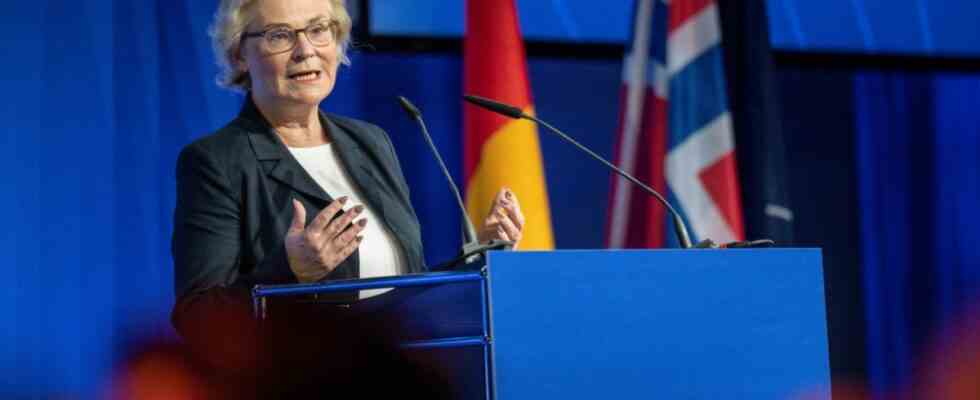It is an unusual sight to behold on this gray Wednesday morning in a business hotel on Landsberger Allee, deep in East Berlin. Uniformed people of many colors mingle with those wearing suits. An exhibition has been prepared for the mixed crowd on the way to the conference hall. The company Schmidt & Bender shows precision rifles, the colleagues from Diehl present a model of their coveted anti-aircraft system Iris-T SLM. If you like, you can also take the ammunition manual from the Norwegian manufacturer Nammo with you. Welcome to the Berlin Security Conference, an industry get-together that was not overly publicized in the past.
Nine months after the Russian invasion of Ukraine and the turning point of the era declared by Chancellor Olaf Scholz (SPD), things are different. Not only Defense Minister Christine Lambrecht (SPD) has announced herself, but also the chancellor himself. Both form something like a defense alliance, as can be seen at the insider conference.
At the general debate last week, opposition leader and CDU leader Friedrich Merz Scholz accused Scholz of breaching his word because the defense budget is not increasing as promised and NATO’s goal of investing two percent of economic power in defense is still being missed. Lambrecht is also under pressure because none of the EUR 100 billion in assets has arrived in the Bundeswehr and everything is lacking, especially ammunition.
Representatives of the federal government see themselves in need of explanation
“It depends on credible combat effectiveness,” warns Celeste Wallander, Secretary of Defense for International Security Affairs at the US Department of Defense, during a panel discussion. These are words that are not explicitly aimed at the German hosts, but the representatives of the federal government feel that they have a hard time explaining themselves to the international audience. Green politician Tobias Lindner, Minister of State in the Foreign Office, solemnly declares: “I am convinced that the 100 billion euros will be spent in three to five years.” Germany will keep its promises to the alliance.
“The signs are pointing to a turning point,” Lambrecht then begins her speech, in which she doesn’t spend long with the prepared text. After months of criticism, Lambrecht made a kind of plea on his own behalf. A lot has to change and a lot will change, she says. Lambrecht refers to the arms aid for Ukraine and the German contribution to strengthening the eastern flank.
“It is important to us Germans that our allies know that they can rely on us. We are loyal partners and, above all, very committed partners,” affirmed the minister. She repeated the offer to support Poland with the Patriot system in air defense “if desired,” although the Polish government has already indicated that it would be happy to forward the offer to Ukraine.
The minister speaks of “a very, very difficult situation”.
Lambrecht also talks for a while about European air defense. She is grateful to the Chancellor for taking up the subject. 15 states have already joined. That’s the “spirit” of the turning point, Lambrecht enthuses and then apparently realizes that the audience is still interested in something. “You all read the newspapers, of course. It’s nothing new that the Bundeswehr has been neglected for many, many years, that it has been saved for many, many years and we are in a very, very difficult situation too,” she gets to the point . “But that has to end. We can’t go on like this,” she exclaims.
The 100 billion euro special fund is not a “fixed number,” says Lambrecht, but corresponds to the need to procure a replacement for the Tornado fighter plane, to close gaps in heavy transport helicopters and to “finally buy radios that are interoperable”. . Lambrecht says that all the money is important, but it is just as important to break down encrusted structures, for example in legislation. For some, that may sound like “small-small,” but if 20 percent of all orders in the Bundeswehr could be awarded “privately” in the future, then “that would be a liberation.”
The turning point in the Bundeswehr is “a lot more than just a lot of money,” the commander of the two-man alliance Scholz-Lambrecht added a little later. “From procurement to equipment, from strategy to operations, we need more decision-making, more willingness to take risks and more efficient structures,” demands the Chancellor.
“We are talking here about the largest investment in our armed forces since it was founded,” says Scholz about the 100 billion assets. The first supply contracts should be concluded this year, he assures. This applies to the purchase of F-35-combat aircraft, the retrofitting of armored personnel carriers puma and the procurement of over-snow vehicles.
Scholz also places the message that the uniformed people in the hall in particular are waiting for. “The core mission of our armed forces is national and alliance defense – the defense of freedom in Europe,” he clarifies. No aggressor should “ever doubt that we are determined to defend every ally and every inch of Alliance territory with all the forces at our disposal.”
After the performance, Scholz has an appointment for dinner with Norwegian Prime Minister Jonas Gahr Støre and NATO Secretary General Jens Stoltenberg. After the attack on Nord Stream, NATO should play a stronger role in protecting maritime infrastructure, especially pipelines. Scholz announces that Germany also wants to do more in this area in the future.

